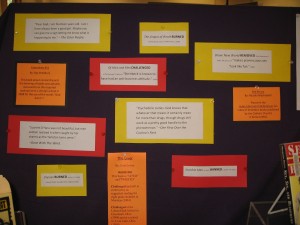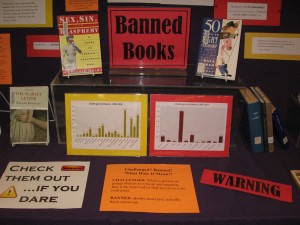 Ida Craddock was 45 years old when she took her own life in 1902. Anthony Comstock was a post office employee and mail inspector for which the Comstock Law is named. This law had made it a federal crime to send “obscene, lewd, and/or lascivious” materials through the US mail. Ms. Craddock had, one year previous, written an account of a mystical-erotic experience she had on which Comstock arranged for her to be arrested and prosecuted. The lawyer who appeared on Ms. Craddock’s behalf defended her by saying “no woman in her right mind would write such a book.”
Ida Craddock was 45 years old when she took her own life in 1902. Anthony Comstock was a post office employee and mail inspector for which the Comstock Law is named. This law had made it a federal crime to send “obscene, lewd, and/or lascivious” materials through the US mail. Ms. Craddock had, one year previous, written an account of a mystical-erotic experience she had on which Comstock arranged for her to be arrested and prosecuted. The lawyer who appeared on Ms. Craddock’s behalf defended her by saying “no woman in her right mind would write such a book.”
Books about sex, dealing with sexual feelings or behavior, or acknowledging the existence of anatomical differences have drawn the most challenges and bans, particularity in public and school libraries. It is the number one reason that books have been challenged. America’s long history in the suppression of materials that were deemed offensive, inappropriate, indecent, corrupting, or “filthy” are rooted in Anglo-American and Protestant Christian culture but carry consequences, apparent in the sad case of Ida Craddock, that are born out of fear, control, and prejudice.
While many of these challenges and bans may seem quaint, extreme, or just plain silly, this way of thinking and course of action continues to this day. Church groups and “concerned parents” still rally against what is and isn’t OK for others to be exposed to, most recently seen in the burning of the Koran in Florida which resulted in the deaths of nine people in Afghanistan. We also see very strong push back against music lyrics and videos, films, and the internet. State and federal government continue to be involved in tracking and investigating images and films deemed to be obscene, many of which however involve minors and the internet.
 While practically no one will disagree that individuals who harmfully exploit others for their own pleasure or profitable gain should not be punished, the rub comes between the rule of law and the regulation of morality. Throughout American history this has materialized in alcohol prohibition, access to legalized abortion and reproduction services, and the criminalization of homosexuality. But the key issue here is about censorship and access to information. Librarians and others are committed to allowing citizens to access materials on any topic one wishes to explore. It is only by opening up an honest discussion that we may understand each other and the world around us.
While practically no one will disagree that individuals who harmfully exploit others for their own pleasure or profitable gain should not be punished, the rub comes between the rule of law and the regulation of morality. Throughout American history this has materialized in alcohol prohibition, access to legalized abortion and reproduction services, and the criminalization of homosexuality. But the key issue here is about censorship and access to information. Librarians and others are committed to allowing citizens to access materials on any topic one wishes to explore. It is only by opening up an honest discussion that we may understand each other and the world around us.
In honor of Banned Books Week we ask that you take advantage of the wealth of information that is available to keep you informed and aware and, of course, enthralled. We need people like Margaret Sanger and Malcolm X to shine a light, and we need people like Alice Walker and John Steinbeck to tell our stories. For more about fiction and why literature is important, check out what some contemporary authors have had to say.
 You can watch others and participate yourself in the Virtual Read-Out here and check out a complete list of frequently challenged books here. Which books have you read? And which books will you be reading?
You can watch others and participate yourself in the Virtual Read-Out here and check out a complete list of frequently challenged books here. Which books have you read? And which books will you be reading?

